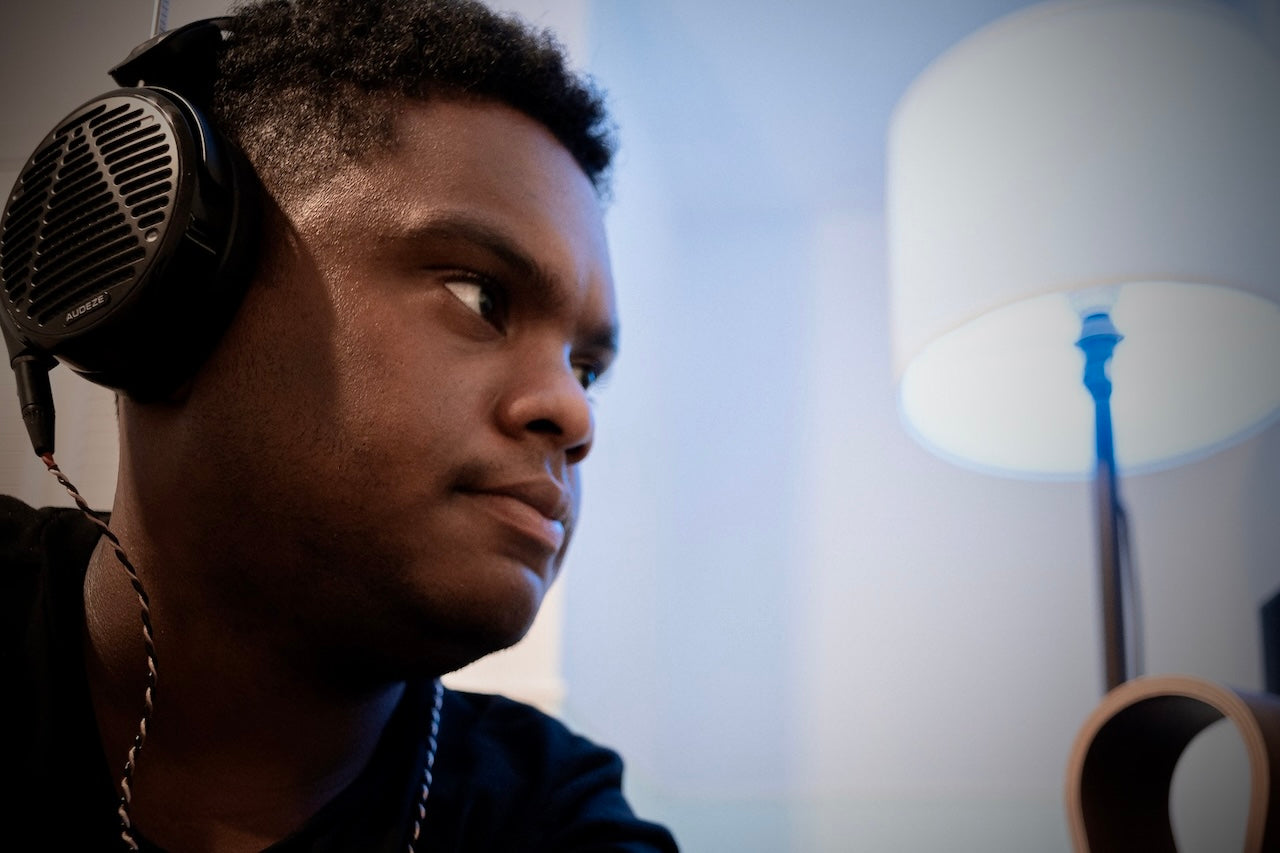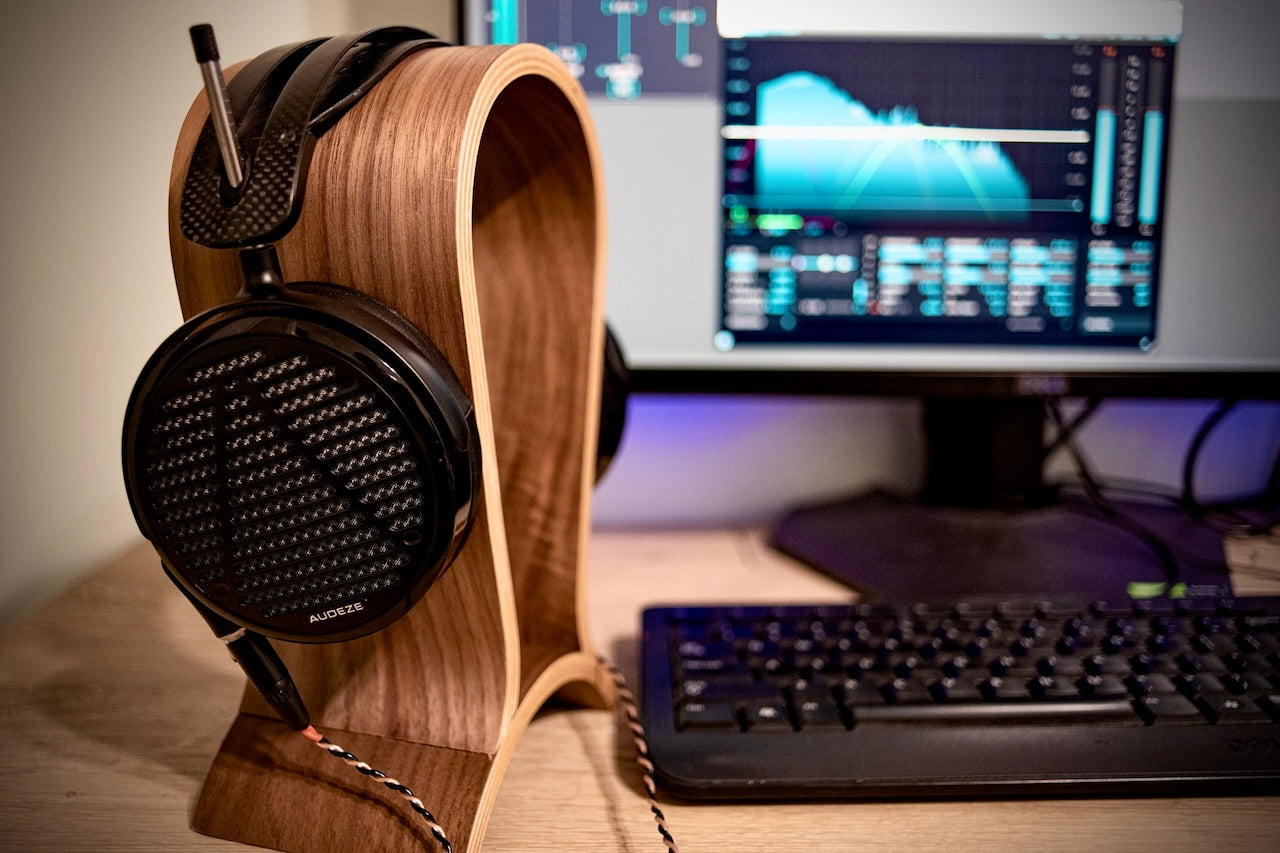
Congratulations to all our Audeze Artist Grammy winners for 2024!

Audeze chats with Platinum, Gold, and Grammy winning mastering engineer Glenn Schick

Kristian Kohle is a German Metal Producer and head of Kohlekeller Studios, who is also known for his educational content on YouTube and in his academy Kohle Audio Kult.

The Audeze Artists of Metropolis Studios

Headfonics profiles and reviews the MM-500

Audeze LCD-5, LCD-X & LCD-3 Make Moon Audio's Best Audiophile Headphones List

Andres Franco talks about why El Ritmo uses LCD-X for every project.

Justin Gray gets into details about his Audeze collection and how he uses each model: LCD-5, CRBN, LCD-4, LCD-4z, LCD-XC & LCD-1
April 30, 2024
Based in the Los Angeles Valley Area, Shane Slack has contributed to notable productions for major networks and platforms such as Apple TV+, AGBO, CBS, Disney+, NBC, SHOWTIME, WWE, Fox Entertainment, USA Network, and National Geographic. Notable credits include MARVEL'S "Deadpool & Wolverine," "Guardians of the Galaxy Vol. 3," Apple TV's "Ted Lasso," Netflix's "Umbrella Academy," "MANIFEST," and "NCIS: LA."
Shane is a graduate of Valencia College’s Sound & Music Technology program and continues to study acoustics and multimedia specializations for the joy and the practicality of ongoing study. Currently the lead engineer & owner of Mono Theory, Inc., a mastering, sound post-production, and Foley studio for television, film, and music projects, he also moonlights as an assistant engineer at Hacienda Audio, specializing in audio mastering, psycho-acoustics, and post-production sound design.
Shane is also a member of the Recording Academy (GRAMMYs) and the Audio Engineering Society. For the AES, he serves as coordinator and speaker for their Mastering Academy, and sits on the Diversity, Equity, & Inclusion Committee.

Oh man, so many to talk about—let alone name! I love the work that I did with the WWE, especially the music we did for their SLAMMY’s last year – that was a such a fun project to be a part of—and the fact that my mastering was heard on national television and online through their official channels is quite an honor. Also, there’s the remaster of Machine Girl’s WLFGRL re-release over at Hacienda Audio where I worked with Matt Davis and his apprentice Sean. We also worked on some material for Dirt Monkey and The Creature Cage long ago that has been extremely successful. My latest work is for a film that is currently going to both to Tribeca and Toronto International Film festivals. That’s all I can say about it now, but it’s my most extensive project to date.
I work predominantly on mastering audio, which is misunderstood and misrepresented within the audio production community as well as within the music industry in general. There is more to the craft than making a song “sound louder.” Mastering involves preparing audio for mass-digital distribution services (Spotify, TIDAL, Apple Music, SoundCloud, YouTube and etc.) as well as physical releases (Vinyl and CD) and translation between different media, working to maintain a consistency of quality and clarity no matter what device will eventually play the audio. People are starting to see the importance of mastering. In fact, because it’s easier now than ever to record and release music, the role of mastering has become much more salient, and I’m pleased to facilitate a higher quality of audio releases.
During my childhood, reggae and old Motown records blasted from my father’s sound-system while my mother did housework. I was exposed to music constantly. I don’t think a single day passed in my youth when I wasn’t surrounded by music. I remember when I first got a PlayStation and then a GameCube back in the early 2000s, I wouldn’t play the games so much as pause them—or find an area with no enemies—and listen to the music, the elements that created the ambiance, and all the other sounds that evoked that world. I would leave this audio world playing while I did other things, such as play with LEGOs or do chores around the house. The Legend of Zelda: Majora’s Mask was the game I can say made the largest contribution to the foundation of my professional orientation as a sound engineer. I can go on for hours how that game influenced me, but I think I’ll leave it there for now.
I have legit been inspired by everything I have ever heard, which makes it difficult to narrow it down, but I will try. Ok, if we start from who creates the most visceral reactions, I will say George Harrison, Jimi Hendrix, Yoko Shimamura, Bonobo, Daft Punk, Marvin Gaye, BADBADNOTGOOD, and The Blaze. However, I must also acknowledge the musical influences of my friends Tomas, Shane, and particularly Devan who got me much deeper into music. Devan got me to explore many different styles and genres of music and pushed me to challenge myself, and without him I would not be where I am today. I also am deeply thankful for the constant encouragement and mentorship of Matt Davis, Bob Katz, Ian Shepard, Ian Stewart, Elaine Rasnake, and Johnathan Wyner, who helped me establish myself, develop my sound, and flourish in the mastering community. I must also thank the many teachers who gave me the courage to pursue my dreams of a career in music: Wendy H., Donna H., and Caroline M.
I remember vividly a job when I was first starting out in 2018. The client was unable or unwilling to go back to the mix engineer to do the extensive stem mastering and revision the job required. I remember fooling myself into thinking that a certain problem could be easily solved, if only I had the equipment some of the more established mastering engineers had at the time. You know, I’m talking about multi-million-dollar equipment that was far beyond my finances. I sabotaged myself with a huge dose of imposter syndrome on top of shame that I didn’t have access to analog gear.
No joke, I am always reaching for my Audeze LCD-X for critical referencing and personal enjoyment. It’s phenomenal to have such a trustworthy source for playback. I can bring them with me on the road and to client studios to check material on, with immaculate scaling to the sound-staging and linearity. I believe that the Audeze LCD-X and my Merging Anubis plus PMC Speakers have been the best investments I have made for myself and my business.
It’s easy to repeat the clichés “never give up” and “follow your dreams,” but the greater insight I offer anyone trying to make their audio career work is to never stop learning and to collaborate and network as much as you can. You’ll be surprised who is and who becomes invested in your growth. Even more important, you will get into situations that will benefit you in the long run and being both adequately knowledgeable and having connections will make these moments a lot more encouraging. We have a plethora of avenues available today such as Discord, YouTube, Facebook Groups, the Audio Engineering Society, the Cinema Audio Society, and so many others. Getting active and involved on those platforms where your contemporaries reside is assured to get you noticed – especially if you show that you have the knowledge and experience to add to the discussion.
Many producers and musicians—and regular consumers out there—don’t have the means or flexibility get accurate monitoring and acoustics into their spaces. For me, that fact by itself warrants doing checks and references on headphones, regardless of whether I’m working on a regular stereo mix/master, cinematic production, or even a full Atmos down-mix. I understand the reluctance to invest in a good pair of headphones, but considering contemporary listening habits, that the vast majority of audio today is consumed on IEMs and headphones, it’s paramount to have a clear frame of reference that aligns with how audiences are consuming music. In the past, speaker configurations were the common standard, but today it’s headphones, and we cannot be stuck in our ways.
When I was finding my footing over a decade ago, I didn’t begin with a pair of fancy monitors or even a good room to work in. My first real reference was a pair of Audeze LCD-2 and later a backup pair of LCD-Xs that I saved up for a long time to afford. Even though I have amassed quite an extensive catalog of gear and monitoring equipment, I reach for my Audeze headphones on the daily. For example, recent work with a film required a lot of travel back and forth between my and the director’s locations to create extra sounds and music for the final cut of the project. This required a lot of Foley mixing and sound design to take full advantage of the theater system’s dynamic range while serving a purpose to the story. Meanwhile, I had other client work and projects that needed mastering before going to distribution. Without my trusty pair of Audeze LCD-Xs and MX4s with me, I wouldn’t have had the confidence that I was providing the best possible end-product to all my clients. The Audeze equipment allowed me to avoid delays to multiple production timelines, because I knew I could trust what I was hearing. It really isn’t any overstatement to say that Audeze equipment is a core component of my business.
Regarding the LCD-5s: The best way I can describe what I am hearing is that this is a new and welcoming direction for Audeze’s tuning for their headphones. The experience the LCD-5 has provided is unparalleled. It is resolving so accurately that it is giving my mains a run for their money legitimately: The bass is articulate yet not overly bloated or flabby.The mids provide this absolutely astounding forward presentation of detail that is both intimate to the listener while also never getting even a bit fatiguing. The highs feel absolutely perfect to me as they aren’t overly aggressive yet you aren’t losing anything whatsoever. This is extremely formative for Audeze’s headphones, and there is no hyperbole when I say they made the best planar headphone out there imaginable.
